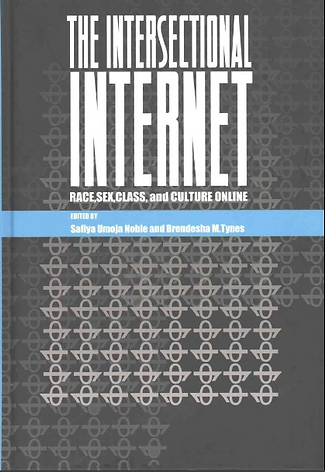Publications
Youth Special Issue: Beyond the Pipeline (2026)
“This Kind of Technology Can… Treat Students Like Threats”: Black Youth Experiences, Reflections, and Articulations of Digital Discipline Under the New Jim Code
Believed by many to be the “silver bullet” that will bring an end to educational inequality, AI technologies continue to proliferate within schools and classrooms, promising to bolster academic achievement, spark student engagement, and ensure campus safety while lessening the burden of overworked and systemically underpaid teachers. Despite this hype, a growing body of critical research is revealing that many of the AI technologies used in schools are rife with algorithmic biases that exacerbate, rather than remediate, educational inequity for historically marginalized students. We extend the work of scholars who have called attention to the rise of tech-mediated racism and the New Jim Code to consider how the proliferation of AI technologies into K-12 schools has worked to hide, speed up, and automate educational inequities for Black students, giving rise to a techno-educational carceral apparatus. To do so, we analyze youth interviews, youth-generated video blogs, and weekly journal reflections of 46 Black students that participated in a critical technology summer course.

ACM CHI (2025)
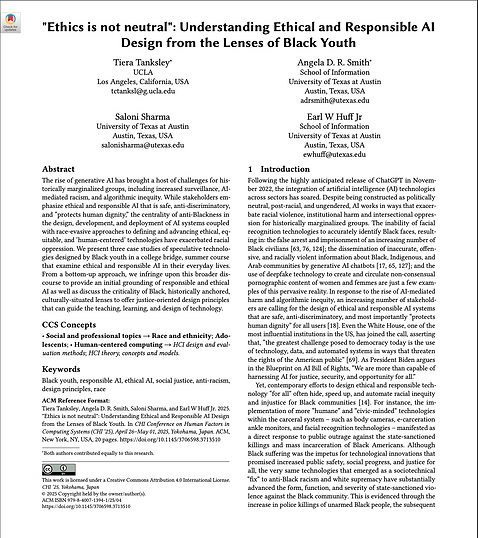
"Ethics is not neutral": Understanding Ethical and Responsible AI Design from the Lenses of Black Youth
The rise of generative AI has brought a host of challenges for historically marginalized groups, including increased surveillance, AI-mediated racism, and algorithmic inequity. While stakeholders emphasize ethical and responsible AI that is safe, anti-discriminatory, and “protects human dignity,” the centrality of anti-Blackness in the design, development, and deployment of AI systems coupled with race-evasive approaches to defining and advancing ethical, equitable, and ‘human-centered’ technologies have exacerbated racial oppression. We present three case studies of speculative technologies designed by Black youth in a college bridge, summer course that examine ethical and responsible AI in their everyday lives. From a bottom-up approach, we infringe upon this broader discourse to provide an initial grounding of responsible and ethical AI as well as discuss the criticality of Black, historically anchored, culturally-situated lenses to offer justice-oriented design principles that can guide the teaching, learning, and design of technology.
Literacies in the Platform Society (2025)
Toward a Critical Race Algorithmic Literacy
This paper centers the experiences of Black high school students who participated in a critical race technology course called “Race, Abolition and Artificial Intelligence.” The goal of the course was to prepare students to interrogate the ubiquity of anti-Black racism within socio-technical architectures (e.g. code, data, algorithms, etc.) of artificially intelligent technologies, including image recognition systems, AI chatbots, predictive analytics, and robot agents. Students leveraged course knowledge to collaboratively design race-conscious and algorithmically-just counter-technologies that could protect and empower Communities of Color. This paper centers the voices, insights and technological creations of the students, and in doing so, introduces a new type of digital literacy: critical race algorithmic literacy.

English Teaching: Practice & Critique (2024)
"We're changing the system with this one": Black students using critical race algorithmic literacies to subvert and survive AI-mediated racism in school
This paper aims to center the experiences of three cohorts of Black high school students who participated in a critical race technology course that exposed anti-blackness as the organizing logic and default setting of digital and artificially intelligent technology. This paper centers the voices, experiences and technological innovations of the students, and in doing so, introduces a new type of digital literacy: critical race algorithmic literacy

Reading Research Quarterly (2024)
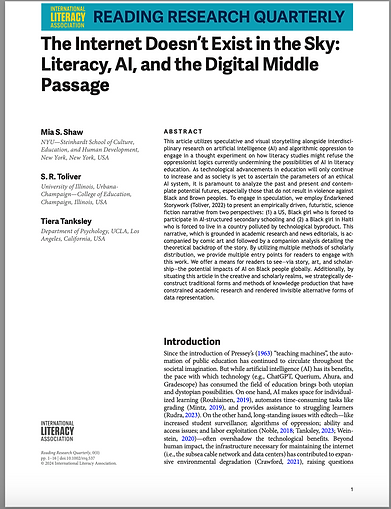
The Internet Doesn’t Exist in the Sky: Literacy, AI, and the Digital Middle Passage
This article utilizes speculative and visual storytelling alongside interdisciplinary research on artificial intelligence (AI) and algorithmic oppression to engage in a thought experiment on how literacy studies might refuse the oppressionist logics currently undermining the possibilities of AI in literacy education. As technological advancements in education will only continue to increase and as society is yet to ascertain the parameters of an ethical AI system, it is paramount to analyze the past and present and contemplate potential futures, especially those that do not result in violence against Black and Brown peoples. By utilizing multiple methods of scholarly distribution, we provide multiple entry points for readers to engage with this work. We offer a means for readers to see—via story, art, and scholarship—the potential impacts of AI on Black people globally. Additionally, by situating this article in the creative and scholarly realms, we strategically de- construct traditional forms and methods of knowledge production that have constrained academic research and rendered invisible alternative forms of data representation.
AI and Digital Inequities Policy Brief (2024)
EdTech is Not Neutral: How
AI Is Automating Educational Inequity
In this international policy brief, I examine the ways artificial intelligence and EdTech are being used to hide, speed up and automate educational inequity for Black students.

Handbook of Youth Activism (2024)

Black youth, digital activism, and racial battle fatigue: How Black youth enact hope, humor and healing online
This study examines the socioemotional and mental health consequences of encountering racially traumatizing digital content for 25 Black youth activists. Qualitative interviews illuminated a spectrum of unintended health consequences as a result of encountering viral images of Black death and dying, including anxiety, depression, fatigue, and exhaustion. In order to cope with digitally mediated trauma, the participants enacted a variety of culturally situated and identity specific healing practices, including restoring the body, the mind, the community, and the soul. We use critical race and Black feminist approaches to healing and technology to offer suggestions and implications.
Critical Meme Reader (2024)
Memes as a Cultural Remedy: A Critical Race Analysis of Black Memetic Resistance
This study uses the #AlabamaRiverBrawl as a point of entry into a more expansive, historically conscious and intersectional analysis of memes as a form of digital activism, reparational joy and politicized play.

The Progressive Magazine (2023)

AI Technology Threatens Educational Equity for Marginalized Students
As schools across the United States rush to implement artificial intelligence for equity, access, and efficiency, it is important to recognize the potential harms of these technologies.
Journal of Computer Science Integration (2023)
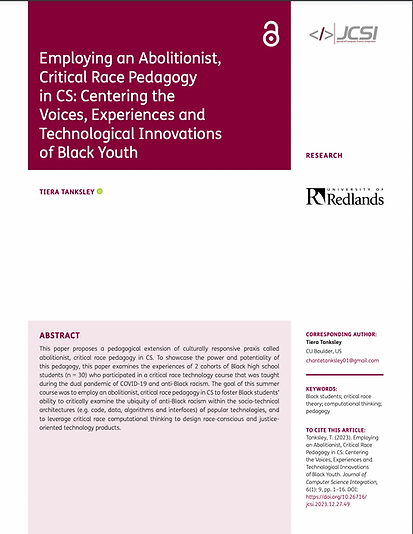
Employing an Abolitionist, Critical Race Pedagogy in CS
Centering the Voices, Experiences and Technological Innovations of Black Youth
This paper proposes a pedagogical extension of culturally responsive praxis called abolitionist, critical race pedagogy in CS. To showcase the power and potentiality of this pedagogy, this paper examines the experiences of 2 cohorts of Black high school students (n = 30) who participated in a critical race technology course that was taught during the dual pandemic of COVID-19 and anti-Black racism. The goal of this summer course was to employ an abolitionist, critical race pedagogy in CS to foster Black students’ ability to critically examine the ubiquity of anti-Black racism within the socio-technical architectures (e.g. code, data, algorithms and interfaces) of popular technologies, and to leverage critical race computational thinking to design race-conscious and justice-oriented technology products.
a|b: Auto|Biography Studies (2023)
Towards a Method of Black Feminist Archival Bricolage: Memory-Keeping within, beneath and beyond the Archive
This essay considers the erasure and visceral laceration of Black women’s herstories from white, masculinized archives, timelines, and cartographies of the past. It simultaneously centers the identity-oriented and historically anchored ways everyday Black women collect, curate, and pass down personal archives for the purpose of intergenerational survival and uplift. In centering the life writings and oral narratives of three Black women in the author’s immediate family, this essay disrupts archival silences around the movements, mobilities, and resistance strategies of everyday Black women; rather, it reveals how Black grandmothers, mothers, and othermothers continue to sustain Black women’s viability and visibility through their work as memory-keepers and family historians. By centering the life herstories of her grandmother, mother, and aunt, the author engages in a process of Black feminist archival bricolage, weaving together fragmented pieces of distinct yet overlapping life narratives that—when put together—tell a more complete and complex story of Black women’s movements, resistances, and archival pedagogies. In doing so, archival fissures are collaboratively challenged in order to reclaim, recover, and recenter the invisible cartographies of everyday Black women.

Parents Magazine (2023)

How Social Media Algorithms Hurt Black Girls
After studying the effect that viral images of police killings had on Black girls, Dr. Tiera Tanksley decided to research further. The results were shocking.
Sage Perspectives: Annual Research Spotlight (2023)
When Black Death Goes Viral: How Algorithms of Oppression (Re)Produce Racism and Racial Trauma
When George Floyd was murdered by police in 2020, his 9-minute death video was viewed over 1.4 billion times online. Likewise, the live stream of Philando Castile being shot by police accumulated over 2.4 million views in just 24 hours. After Sandra Bland was found dead following a minor traffic violation, bodycam footage of her horrific police encounter garnered hundreds of thousands of views in a few short days.

Urban Education (2022)

Race, Education and #BlackLivesMatter:
How Transformational Resistance Shapes the Lives and Schooling Experiences of Black College-Age Women
Grounded in critical race theory and a burgeoning field of Black feminist technology studies, this article takes a techno-structural approach to under- standing the promise and peril of internet technology to support activism, transformational resistance and counter-storytelling for Black college-age- women. Qualitative interviews with 17 Black undergraduate women reveal multiple benefits of leveraging social media for racial justice, as well as the socioemotional and academic consequences of algorithmic racism. These findings support the need to develop new conceptual frameworks that can foster students’ sociotechnical consciousness, and further equip them with the critical race techno-literacies needed to disrupt anti-Blackness both on and offline.
International Journal of Research & Method in Education (2022)
Towards a Critical Race RPP: How Race, Power and Positionality Inform Research Practice Partnerships
This research article challenges the normative construction of RPPs as an inherently equitable, post-racial and ungendered methodological framework. By utilizing critical race theory broadly, and whiteness as property in particular, we highlight how without explicit consideration for the racialization of research identities, RPPs are incapable of disrupting oppressive power structures that hinder equity and social change. As WOC researchers working on a large National Science Foundation granted study, we witnessed two issues in RPP methodologies: (1) institutional power granted by Academe is negated when whiteness is prioritized and minoritized race/gender identities are involved; and (2) niceness is weaponized as a means of protecting education and research as the property of whites in order to maintain the status quo. By utilizing our counterstories to unpack and interrogate the onto-epistemological and sociopolitical infrastructure of RPPs, we offer implications and best practices for how to foster more transformative and racially-just research partnerships. Specifically, we use CRT to theorize a Critical Race-RPP (CR-RPP) methodology that seeks to decentre whiteness and privilege the voices and needs of People of Color and other marginalized communities within schools and academia.

Connected Learning Summit (2022)
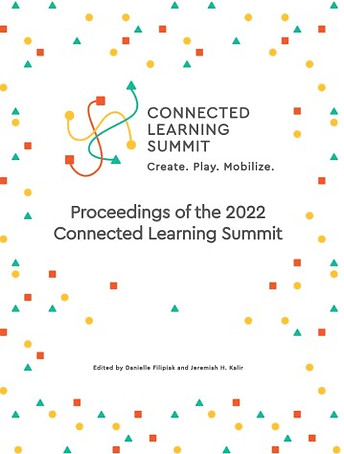
Building a "Home-Place" in STEM:
Leveraging Race, Resistance, and Cultural Wealth to Foster STEM Counterspaces for Youth of Color
This paper examines the power and potentiality of STEM (science, technology, engineering, and mathematics) homeplaces as places of refuge, spaces of healing and sides of radical possibility for Students of Color. Qualitative interviews with two Women of Color educators ground this study, and provide insight into the programmatic features, including cultural norms, policies and practices, that fostered feelings of safety, love, healing, and empowerment for Youth of Color in an otherwise toxic and exclusionary STEM field.
Youth Radio (YR) Media (2020)
Black People Are Dying, So Black Girls Seek Solace in "Safe Scrolling"
LOS ANGELES — Black girls run the internet. No really, they do! If you need proof, just check the digital receipts. Earlier this year, collective viewership of the Verzus Battle: Brandy and Monica set an all-time record for Instagram Live views. Likewise, Black girls have driven some of Twitter’s most viral hashtags. Time and again, Black girls remind the world that they are digital powerhouses — a force to be reckoned with online.

Common Sense Media (2019)
Finding Peace During the Protests

Digital Wellness Tools for Black Girl Activists
The growing use of social media as a platform for social justice activism has illuminated both the promise and the perils of social media for Black teens. On the one hand, teen-led campaigns, like #BlackLivesMatter and #SayHerName, have shed light on the prevalence of racist violence and police brutality against Black Americans. On the other hand, the hypercirculation of graphic murder content has resulted in significant increases in anxiety and depression among Black teens. The complexity of social media to act as both a vehicle for transformative change offline and a conduit of racially traumatizing content online raises some important questions. Namely, how are Black teens surviving these complicated digital spaces? And are they using social media in ways that support communal coping and digital wellness?
Black Girl Civics (2020)
Texting, Tweeting & Talking Back to Power
How Black Girls Leverage Social Media as a Platform for Civic Engagement
Though they represent a minoritized group in the US, Black teens and young adults play a prevalent role in constructing national discourse on racial justice through their politicized social media engagement. Interestingly, as Black girls' social media activism continues to soar, research examining the civic activities of young people continue to position girls and Youth of Color as being politically disinterested and disenchanted. This study sought to disrupt this deficit notion of Black girl civics by centering the voices and digital experiences of 17 self-identified young Black women and girls from across the US and Canada. While the overarching takeaway from these data is that social media is a ripe platform for political activism for users experiencing intersectional oppression, three prominent sub-themes regarding Black girls' explanations for using social media as a platform for civic engagement: 1) social media provides a sense of safety and visibility for young Black women; 2) social media serves as a space for collective anguish, healing and solidarity; and 3) social media provides a renewed sense of trust in news and current events.
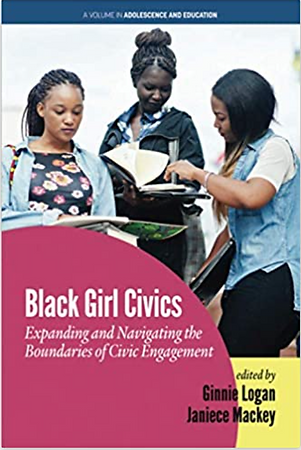
The Intersectional Internet (2016)
Education, Representation and Resistance
Black Girls in Popular Instagram Memes
In recognizing the pervasive presence of popular media, particularly social media, in the lives of today's youth, I also examine the ways that Black girls resist misrepresentation and represent themselves more powerfully by talking back to popular culture through social media. I then analyze the discourses of Black girls on Instagram and discuss and propose a nuanced critical media pedagogy, or a Black feminist media literacy, which can emerge as a way of thinking about resistance to misrepresentation as Black girls combat multitudinous microaggressions in the media, in schools, in their communities and online. This framework merges Black feminist thought (Collins, 1990), critical race theory (Bell, 1992) and intersectionality (Crenshaw, 1991) to theorize a media literacy framework that can illuminate the pervasive reality of racism and sexism in social media, while simultaneously exhuming their injurious effects on African American girls, both inside and outside of school (Noble, 2012).
